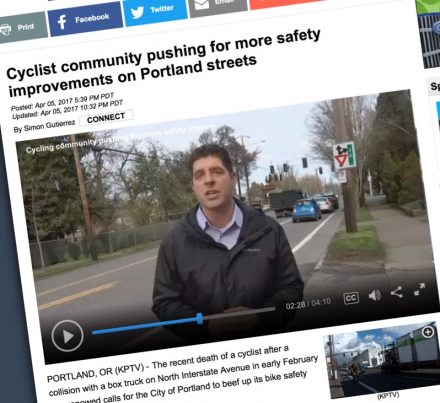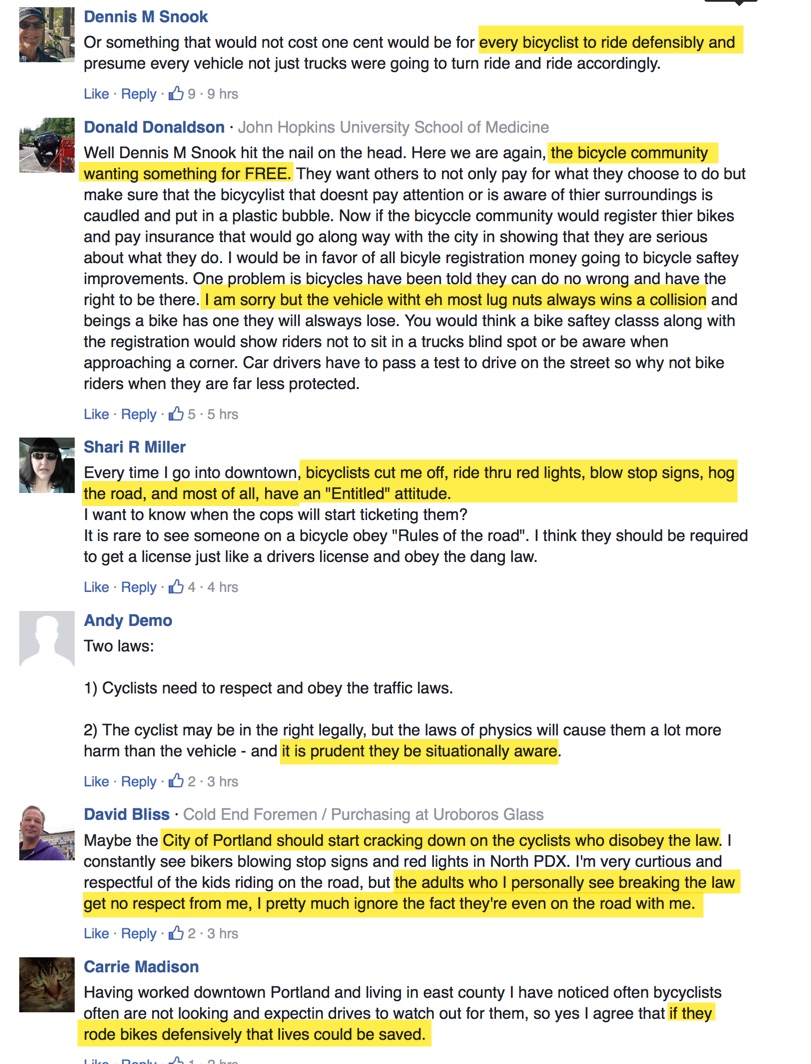 Just over two months ago 53-year-old Alan Marsan was killed while bicycling on North Interstate Avenue. He was going north and a large commercial truck turned right across his path.
Just over two months ago 53-year-old Alan Marsan was killed while bicycling on North Interstate Avenue. He was going north and a large commercial truck turned right across his path.
Based on observations from the scene it was a classic right hook. The truck was stopped a few dozen feet from the intersection and Marsan and his bike were lodged just in front of the rear wheels.
That collision was just the latest in a long line of right hooks that have left bicycle riders dead in Portland over the years. As I stood at the scene of Marsan’s death, the names of other people who’ve died in fatal right hook collisions with trucks flashed through my head: Tracey Sparling, Brett Jarolimek, Kathryn Rickson, Kirke Johnson, Lydia Johnson (no relation).
Bicycles, large trucks and right hooks is one of Portland’s most vexing traffic safety problems. It’s maddening that we haven’t made more progress on it in the past decade.
But don’t take my words for it. Here’s what Susan Kubota, aunt of Tracey Sparling, who was hit and killed in a right-hook collision in Portland in 2007, told KPTV in a story they aired last night:
“It’s very disheartening that this is almost 10 years since Tracey was killed, and these things are still happening.”
I could not agree more with Ms. Kubota. One simple step we could take is to require the installation of side guards on trucks. Side guards might help prevent deaths by keeping human bodies away from a truck’s undercarriage and wheels. A study from the United Kingdom (which inspired Seattle’s department of transportation to mandate the guards on their fleet) found they reduced deaths by 61 percent. We could start with City of Portland vehicles and then use policy and public pressure to get private companies to follow suit. But so far the City hasn’t taken that step. Back in February, a bureau of transportation spokesperson told us it would cost about $3,000 per vehicle. They say there’s no money for it.
Fast forward to last night when KPTV aired a report on the issue. Here’s where things get weird.
KPTV’s headline and reporting framed the issue as being of great concern to the “cyclist community.” “Cyclist community pushing for more safety improvements on Portland streets,” read the headline.
As many of you know, I have a big problem with labels like “cyclist community.” What even is that? Am I member? Are you a member? Is Tracey Sparling’s aunt Susan Kubota a member? Are Alan Marsan’s kids and family part of the “cyclist community”? Or are we just regular people who want safer streets? Even though KPTV doesn’t use the label with any intended malice, I firmly believe labels like this are unnecessary and harmful.
Advertisement
Labels are lazy. They allow us to paint with a broad brush instead of taking the time to speak in more detailed strokes. Labels assume a large group of people share the same motivations and beliefs when in fact no such common cause exists. Labels also perpetuate hate and divisiveness by serving up a tidy basket for people’s anger. Labels are linguistic punching bags — a conveniently gift-wrapped “other” served on a platter for people to take swings at.
And that’s exactly what happened in response to KPTV’s report on truck side guards. I’m quite used to hate-filled comment sections on network news sites. But the six comments (so far) on this story really bothered me. They are all in lock-step agreement that these calls for safer trucks are simply more whining from “the cyclist community.”
The comments above are very telling. These readers — who feel so safe in our car-centered culture that they say these things with real names on comments linked directly to their Facebook accounts — instantly resort to blaming the victims of these crashes. And of course there’s an immediate urge to absolve themselves (as representatives of all motor vehicle operators) of any guilt whatsoever. It’s really sad on many levels.
Would those responses be the same if the headline and framing of the story was, “City officials want more safety improvements on Portland streets”? After all, that’s true. Side guards for trucks are recommended in our Vision Zero plan.
Compare this to how our society responds to a road safety issue that only involves driving. In 2014 there was great urgency around cable barriers on I-5 after several people died in head-on collisions while driving (including the husband of Portland City Commissioner Amanda Fritz). “Deadly crashes prompt ODOT to rush new I-5 barriers,” read the KPTV headline.
Except in this case, when we have a recurring road safety problem and a relatively simple fix, it’s ODOT and Oregon’s governor who are pushing for the change. And there’s nothing about a “motorist community” “pushing” for changes.
How did people respond to this issue?
“It’s senseless not to have [barriers] when we’ve had so many crashes that have caused injuries or deaths, it just doesn’t make any sense,” one woman told KPTV. “I’m surprised they haven’t already done it. You can’t put a dollar amount on lives,” said another person they spoke to.
And of course there were no comments from readers falsely blaming people the people who died and there were no baseless and completely irrelevant accusations of illegal driving.
The other big difference? The barriers were installed shortly thereafter. To the tune of $7 million.
I can’t help but wonder what the response would be to right-hook fatalities of bicycle riders if the media and society-at-large saw the urgency to fix the problem as coming from anywhere but the “cyclist community.”
— Jonathan Maus: (503) 706-8804, @jonathan_maus on Twitter and jonathan@bikeportland.org
BikePortland is supported by the community (that means you!). Please become a subscriber or make a donation today.


